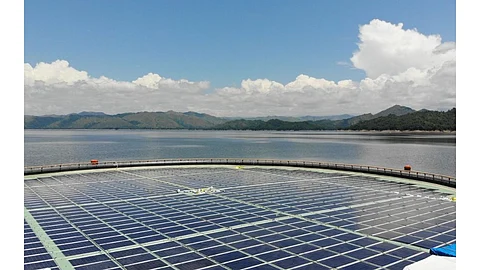

Floating solar in Australia: Australian renewable energy engineering company Canopy Power Australia has joined hands with Norway’s Ocean Sun to explore floating solar market in Australia. They aim to accelerate the deployment of new generation of floating solar projects across the country’s water bodies. Ocean Sun will provide its patented technology of circular membrane-based floater that measures 70 m in diameter. High-efficiency solar panels are then installed on this membrane to provide 700 kW of PV capacity.
AM services for 312 MW: A unit of the Japanese renewable energy developer Shizen Energy Group, Shizen Operations has secured asset management (AM) contract for 312 MW of solar power plants by Nozomi Energy. Actis-backed Nozomi acquired this portfolio of 12 projects in December 2024 (see Asia Pacific Solar PV News Snippets: X-Elio Seeking Approval For 720 MW Australian Solar & Storage Farm & More). Shizen integrated its AM business division into Shizen Operations in November 2024 to club its O&M and AM services as a one-stop solution.
Chinese solar factory in Indonesia: Chinese solar company Yisheng Material has commissioned phase I of its 1 GW TOPCon module factory in Batam, Indonesia. The factory is spread in an area of about 100 mu. It will produce high-efficiency modules in 182 mm and 210 mm sizes. With this factory, Yisheng aims to cater to the broader Southeast Asian market.
12 MW project to be repowered: Japan’s ENEOS Renewable Energy Corporation (ERE) plans to carry out repowering of its 12.2 MW Uruma Mega Solar Power Plant in Okinawa Prefecture of Japan, in partnership with Hamada Co. Ltd. Having started its commercial operations in March 2015, the project is managed by the company’s subsidiary ENEOS Renewable Energy Management Corporation. The latter will be responsible for the project’s repowering and recycling. The project’s EPC Hitex Corporation will remove close to 50,000 solar panels, replacing these with newer ones by April 2025. Old solar panels will be recycled at a recycling rate of around 90.2% with the glass portion to be effectively reused. The glass represents close to 60% of the panels. ERE believes repowering with higher efficiency and low-cost solar panels will increase the value of the power plants as projects age.
Midsummer and Eco partner in Thailand: Swedish thin-film solar manufacturer Midsummer has signed a distribution agreement with Thailand-based solar distributor and installer Eco On, previously known as Gold Stone Energy Thailand. It will distribute and install the company’s lightweight and flexible solar panels that weigh 3 kg/m² across the country. These will be installed for commercial and industrial buildings with flat roofs and for floating offshore solar applications. In November 2024, Midsummer entered a partnership with Saab AG for a 200 MW solar cell production factory (see Sweden’s Midsummer Exploring Thailand For Thin-Film Cell Production). Midsummer said that the agreement with Eco On is the ‘next step in these preparations.’
75 MW project in the Philippines: Singapore-based renewable energy developer Gurīn Energy has commissioned its maiden solar project in the Philippines. The 80-hectare Palauig Solar Power Plant has 75 MW of installed capacity. It is located in the Municipality of Palauig in the Zambales province. The project is financed by the UnionBank of the Philippines. Power generated from the project will be sold to Aboitiz Power Corporation’s retail electricity units Advent Energy Inc and Advent Power Inc. for their commercial and industrial (C&I) customers.
Japan foray for Lightsource bp: Lightsource bp, the British solar power developer, has expanded to the Japanese market with the acquisition of a 15 MW solar project in Hokkaido whose details it did not share in a statement released. The company says this entry into Japan is an important step in its broader APAC growth strategy. It already operates in the nearby markets of Australia, New Zealand, Taiwan and South Korea. Lightsource bp has a development pipeline of more than 58 GW of mature and early-stage projects including around 8 GW in the APAC region. It now operates in 20 global markets.
TrinaStorage in Japan: Trinasolar’s TrinaStorage has successfully delivered what it calls the first high-voltage independent energy storage power station project in Japan. The project uses TrinaStorage’s Elementa King Kong 2 energy storage system (ESS). This is a 20-foot container module solution that has passed the rigorous testing of the Japan Electrical Safety and Environment Research Institute (JET). TrinaStorage claims it is the 1st overseas brand to obtain this certification in the Japanese energy storage market.
Energy gain for TOPCon modules: According to recent field tests conducted by TÜV Nord in Kagoshima, Japan, n-type TOPCon modules achieved 8.82% long-term energy yield gain over n-type back contact (BC) modules. These modules were studied for a 3-month period from October 2024 to December 2024 as part of a year-long study. The field test was conducted at the Kagoshima Field Testing Base in Japan with bifacial n-type TOPCon and monofacial n-type BC modules installed. TOPCon modules were reported to have generated 174.04 kWh, with a yield gain/W of 8.10% compared to n-type BC modules. Additionally, the performance ratio value of TOPCon modules reached 97.8%, while that of n-type BC modules was 89.9%.
JinkoSolar’s Australian ESS business strengthening: JinkoSolar’s energy storage system (ESS) arm Jinko ESS’ SunGiga all-in-one ESS has been independently verified to meet key Australian standards, namely AS3000, AS3008, AS5139, and AS4777. The company says it has so far deployed more than 30 units across Queensland, New South Wales, and Victoria. It plans to expand further to South Australia and Western Australia. JinkoSolar separately also announced exceeding 1 GW in distribution shipments to Australia in 2024.
